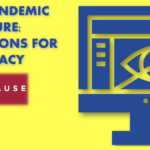| Generator: | https://wordpress.org/?v=6.4.3 |
| Docs: | http://blogs.law.harvard.edu/tech/rss |

Post-Pandemic Future: Implications for Privacy The time has come for privacy to expand beyond compliance to include determinations about what should be protected and consideration of ethical implications, balancing institutional priorities with the rights of individuals. The intersection of issues including COVID-19, student success, and the emergence of the chief privacy officer (CPO) role highlights […]
The post Download Reports: Post-Pandemic Future: Implications for Privacy first appeared on Course Strat.
Ambitious Mashups: Reflections on a Decade of Cyberlearning Research This report reflects on progress from over eight years of research projects in the cyberlearning community. The community involved computer scientists and learning scientists who received NSF awards to investigate the design of more equitable learning experiences with emerging technology—focusing on developing the learning theories and […]
The post Download Report: Ambitious Mashups: Reflections on a Decade of Cyberlearning Research first appeared on Course Strat.
Change management processes and learning adaptations that accompany quality assurance (QA) in higher education are an understudied phenomenon. This article describes a first-tier, phenomenological qualitative research study on the usability of the Continuum of Excellence in Quality Assurance (CEQA) model as a tool that institutions might use to identify, assess, and strategically embed institution-wide processes […]
The post Quality Assurance Implementation: How it Works first appeared on Course Strat.
Because of the COVID-19 pandemic in late 2019 and early 2020, universities, schools, and businesses in the United States closed and moved online (CDC, 2020; “A Timeline of COVID-19 Developments in 2020,” 2020). By April, 2020, it became clear that the school year would end virtually, (Anderson, 2020). Teachers throughout the United States found themselves […]
The post Elementary Educators’ Experiences Teaching during COVID-19 School Closures: Understanding Resources in Impromptu Distance Education first appeared on Course Strat.
Kansas was the first state to close P-12 schools and move to a continuous learning model in response to the COVID-19 pandemic. A multidisciplinary group of K-State College of Education faculty researchers conducted a survey in May, 2020 to capture the voices and experiences of Kansas teachers, school counselors, and administrators during that time related […]
The post Download White Paper: Access, Engagement, and Resilience During COVID-19 Remote Learning first appeared on Course Strat.
The emergency shift to remote learning that took place during the spring 2020 term in response to the COVID-19 pandemic created unprecedented disruptions for students and faculty across colleges and universities, nationwide and globally. As online and hybrid models of learning become prolonged solutions for institutions seeking to contend with the realities of the pandemic […]
The post Download Report: Student and Faculty Experiences with Emergency Remote Learning in Spring 2020 first appeared on Course Strat.
With two months left in the fall quarter, UCLA has announced that remote learning will continue in the winter quarter while other UC campuses continue to assess plans for the new year. The university will still allow exceptions for students who must attend hybrid courses, but online instruction will remain in place when the next […]
The post ‘Disheartening’ news at UCLA: Online learning will continue next quarter first appeared on Course Strat.
Students and teachers may be back in school now, but things are not as they were before. That is especially true when it comes to today’s substantially heavier reliance on technology to stay connected. Although schools are adapting to the new normal of remote learning, so are cyber attackers who are taking advantage of the […]
The post 3 Reasons Why Open Dialogue on Cybersecurity is Vital for Educators in the Distance Learning Era | eLearningInside News first appeared on Course Strat.
Moving new student orientations to a fully online or blended format has made these programs more affordable, convenient, and accessible for students and their families, and more efficient and streamlined for college and university staff. EDUCAUSE Review
The post 3 Reasons to Go Online with New Student Orientations first appeared on Course Strat.
Fostering student academic leadership in an online environment can be challenging. How can a program provide peer support to students while equipping them for current and future leadership roles? Discussion will include an analysis of the Doctoral Graduate Assistant Program and Doctoral Advisory Board opportunities at American College of Education. Online Journal of Distance Learning […]
The post I’ve Been There! Fostering Student Academic Leadership in the Online Environment first appeared on Course Strat.